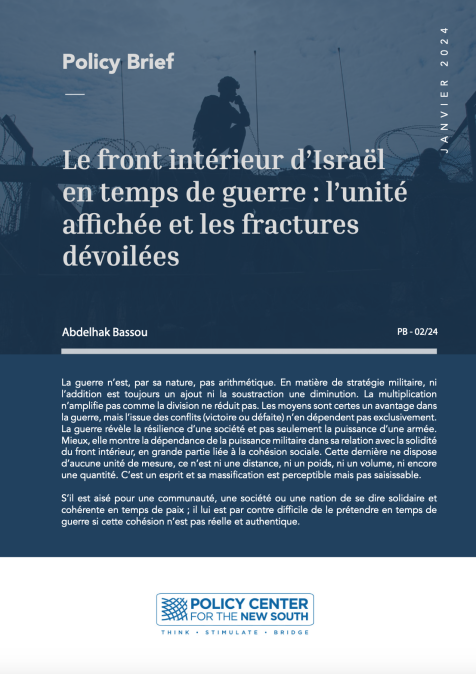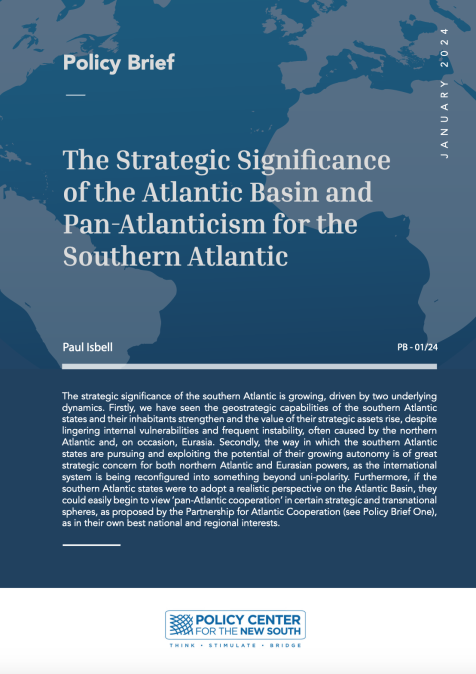Paul-Simon Handy, Regional Director for East Africa and Representative to the African Union, delves into the complexities of mediation in internal African conflicts. Despite half of the UN peacekeeping forces being deployed on the African continent, sustainable peace remains elusive. Mr Handy explores the reasons behind these challenges, shedding light on the intricate dynamics and obstacles that hinder effective conflict resolution.
RELATED CONTENT
-
AuthorsElhoussaine WahyanaJanuary 12, 2024The debate on global value chains (GVCs) has emphasized countries’ contributions to value-added creation. From an intercountry perspective, a new body of research is addingto this debate by studying how subnational regions contribute to the indicators in specific countries. Proper assessment of economic contributions is essential for designing incentive policies. This paper analyzes the role played by the main trading partners of Moroccan regions in local value chains. We use input- ...
-
Helmut Sorge and Nathalie DelapalmeJanuary 12, 2024In this podcast, Ms. Nathalie Delapalme, Executive Director of the Mo Ibrahim Foundation, presents a compelling philosophical approach to understanding the new Africa. Ms. Delapalme empha ...
-
AuthorsJanuary 12, 2024A 2023 United Nations progress report (UN, 2023) showed that, of the 169 targets that make up the Sustainable Development Goals (SDGs), only 15% are on track, and progress on many has either stalled or regressed. The Water-Energy-Food nexus approach has highlighted the utmost importance of understanding the interconnections between systems in order to accelerate the achievement of the SDGs. In this policy brief, we use the lessons learned from the water sector through a case study f ...
-
January 11, 2024Dans cet épisode, nous abordons la sécurité sanitaire en Afrique, un continent aux réalités socio-économiques variées. Malgré des défis majeurs tels que la mortalité infantile et les maladies infectieuses, les systèmes de santé sont sous-financés. Nous mettons en lumière les acteurs clé...
-
January 9, 2024نعود إلى أبرز حلقات الموسم الفارط من برنامجنا الأسبوعي حديث الثلاثاء، حيث دارت أغلب نقاشاتنا حول الجنوب الجديد وقضايا المحيط الأطلسي الموسع، بالتركيز على التعاون كآلية منسِّقة لتحديات مثل التغير المناخي والمساهمة في السلام والأمن في المنطقة. إذ أنه بالنظر إلى ديناميكيات التكامل الإقليم...
-
January 8, 2024Due to its geography, Japan has a long experience of major natural disasters, ranging from tsunamis to typhoons. Dealing with such events has thus been streamlined into the regular functioning of the country, the third worldwide in terms of nominal GDP, and a major contributor of aid gl...
-
Abdessalam Jaldi & Kassie FreemanJanuary 08, 2024The role played by diasporas in international relations should not be neglected. Bilateral engagements between states can be significantly affected by the practical and perspective relati ...
-
AuthorsJanuary 5, 2024La guerre n’est, par sa nature, pas arithmétique. En matière de stratégie militaire, ni l’addition est toujours un ajout ni la soustraction une diminution. La multiplication n’amplifie pas comme la division ne réduit pas. Les moyens sont certes un avantage dans la guerre, mais l’issue des conflits (victoire ou défaite) n’en dépendent pas exclusivement. La guerre révèle la résilience d’une société et pas seulement la puissance d’une armée. Mieux, elle montre la dépendance de la puiss ...
-
AuthorsPaul IsbellJanuary 3, 2024The strategic significance of the southern Atlantic is growing, driven by two underlying dynamics. Firstly, we have seen the geostrategic capabilities of the southern Atlantic states and their inhabitants strengthen and the value of their strategic assets rise, despite lingering internal vulnerabilities and frequent instability, often caused by the northern Atlantic and, on occasion, Eurasia. Secondly, the way in which the southern Atlantic states are pursuing and exploiting the pot ...
-
 AuthorsJanuary 2, 2024This paper was originally published on The South African Institute of International Affairs (SAIIA) In order for Africa to raise living standards, create employment for youth and diversify exports, it must industrialise. Until recently, sub-Saharan African (SSA) countries made limited progress in manufacturing value addition and employment, mirroring the de-industrialisation trend seen in many developing countries. To propel industrialisation, SSA countries should adopt flexible st ...
AuthorsJanuary 2, 2024This paper was originally published on The South African Institute of International Affairs (SAIIA) In order for Africa to raise living standards, create employment for youth and diversify exports, it must industrialise. Until recently, sub-Saharan African (SSA) countries made limited progress in manufacturing value addition and employment, mirroring the de-industrialisation trend seen in many developing countries. To propel industrialisation, SSA countries should adopt flexible st ...







